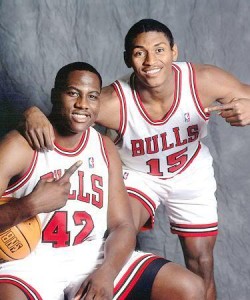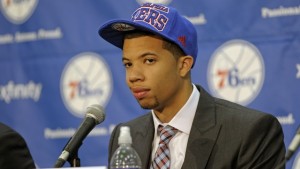We asked this question in our last edition of the Rookie Rankings: Can a player from a 65-loss team win Rookie of  the Year?
the Year?
The answer: One already has.
In the 1999-2000 season, the Chicago Bulls were continuing their rebuilding following the second retirement of Michael Jordan and went 17-65. One of their few bright spots was a young power forward named Elton Brand, who averaged 20.1 points and 10.1 rebounds and shared Rookie of the Year honors with Houston’s Steve Francis.
But Brand is not an outlier. In the draft lottery era, he is among five players who have won Rookie of the Year playing for 60-loss teams, and there are another two winners whose squads went 23-59.
For example, Kevin Durant was the 2008 Rookie of the Year – and led the Seattle SuperSonics to a sterling 20-62 mark. In 2005, Emeka Okafor outpolled both Dwight Howard and Sixth Man Award winner Ben Gordon despite an 18-64 record by his Charlotte Bobcats.
In 1997, Allen Iverson won even though the Philadelphia 76ers improved just four games to a 22-60 record. And two years earlier, Damon Stoudamire was a clear-cut choice as top rookie despite Toronto’s 21-61 mark.
What this shows is that historically, the media panel doesn’t look very hard at the team’s record when voting for Rookie of the Year. Which means Michael Carter-Williams still has a very good chance to win.
Carter-Williams already is the statistical winner. His 17.1 points per game is more than 3 ppg better than any other debutante, and he is also first among rookies in minutes, assists, steals (fourth in the NBA) and double-doubles.
But Carter-Williams plays for the Philadelphia 76ers, who are making everyone wonder if they are ever going to win another game. They are 15-43 and currently riding a 12-game losing streak, the longest in the NBA this season.
At last week’s trading deadline, the Sixers dealt leading scorer Evan Turner and leading rebounder Spencer Hawes for what amounted to a bag of hammers. The two best players they received in return – Danny Granger and Earl Clark – have been bought out, and the roster looks like it belongs in the D-League.
Philadelphia’s last two losses have been at home to Milwaukee, the league’s worst team which hadn’t won a road game since New Year’s Eve, and Orlando, which hadn’t won a road game since Dec. 16. And the losing is starting to take its toll.
“The effort was extraordinarily poor,” Sixers coach Brett Brown said after the loss to the Bucks.
The Sixers are by far the NBA’s worst defensive team and have an unfathomable point differential of minus-10.7, one of the worst in this millennium. All of which begs the question: Are they going to win another game?
Philadelphia visits Orlando this weekend, and March brings visits from Utah, Sacramento, New York and Detroit. Nine of the last 12 games are on the road. It is possible – not probable, but possible – that the Sixers could end up losing 34 or 35 of their last 36 games, which would definitely impact Carter-Williams’ candidacy.
The best thing working for Carter-Williams is that his only competition comes from similar players on teams rowing similar boats – Orlando’s Victor Oladipo and Utah’s Trey Burke. However, Oladipo has been methodically closing the numbers gap, and the Jazz have been borderline competitive with Burke running the show.
But if the Sixers end up 16-66 or 17-65 – right around where Las Vegas pegged them, we should add – will voters dismiss Carter-Williams because his production took place in an uncompetitive vacuum?
Historically, they have not. But four or five more wins certainly wouldn’t hurt.
On to the rankings.